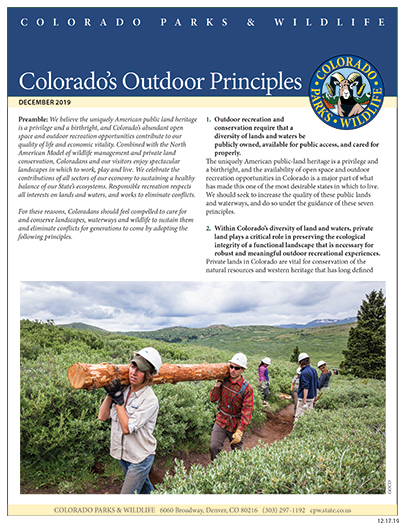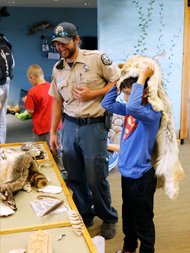Colorado's Outdoor Principles
Page Content
Learn About our Guiding Principles and Influencing Factors
Overview
Colorado’s Outdoor Principles are a set of seven guidelines for advancing outdoor recreation and conservation. They are an addition to the
North American Model of Wildlife Management which we currently use and an effort to further refine an outdoor ethic that promotes both recreational enjoyment and thoughtful conservation of Colorado’s special places. What are Colorado's Outdoor Principles?
 We believe the uniquely American public land heritage is a privilege and a birthright, and
We believe the uniquely American public land heritage is a privilege and a birthright, and
Colorado’s abundant open space and outdoor recreation opportunities contribute to our quality of life and economic vitality. Coloradans and our visitors enjoy spectacular landscapes in which to work, play and live. We celebrate the contributions of all sectors of our economy to sustaining a healthy balance of our State’s ecosystems. Responsible recreation respects all interests on lands and waters, and works to eliminate conflicts.
For these reasons, Coloradans should feel compelled to care for and conserve landscapes, waterways and wildlife to sustain them and eliminate conflicts for generations to come by adopting the following seven
principles:
Public Lands
- Outdoor recreation and conservation require that a diversity of lands and waters be publicly owned, available for public access, and cared for properly.
The uniquely American public-land heritage is a privilege and a birthright, and the availability of open space and outdoor recreation opportunities in Colorado is a major part of what has made this one of the most desirable states in which to live. We should seek to increase the quality of these public lands and waterways, and do so under the guidance of these seven principles
Private Lands - Within Colorado’s diversity of land and waters, private land provides a balance of conservation and access for outdoor recreation and conservation of landscapes.
Private lands in Colorado are vital for the conservation of the natural resources and western heritage that has long defined the state. Private landowners increase the viability of our lands, waters and natural assets by keeping habitat connected and in a natural state. Private landowners and vested parties should be involved in collaborative dialogues whenever possible and turned to for solutions and deeper partnerships.
Working Together - Both recreation and conservation are needed to sustain Colorado’s quality of life. Both are beneficial to local economic well-being, for personal health, and for sustaining Colorado’s natural resources.
This mutual need exists because outdoor recreation helps people understand the importance of maintaining healthy, intact ecosystems. In turn, that understanding builds support for natural resource protection and stewardship, and conservation protects the land, water and wild places upon which outdoor recreation depends.
Minimize Impact - All recreation has an impact. Coloradans have an obligation to minimize these impacts across the places they recreate and the larger landscape through ethical outdoor behavior.
Ethical outdoor behavior demonstrates respect for land, water, and wildlife. This outdoor ethic is critical and must be developed in all users and taught to future generations.
Management and Education - Proactive management solutions, combined with public education, is necessary to care for land, water, and wildlife, and to provide the protections needed to maintain quality recreation opportunities.
Active public engagement in crafting solutions is necessary to ensure land management decisions reflect a consensus and can be effectively implemented. A broad, landscape approach is necessary in order to meet both conservation and recreation needs. Collaborative decision-making is needed to decide which activities are best suited for various landscapes.
Science-based Decisions - Physical, biological and social science must inform the management of outdoor recreation.
Management decisions should be grounded in the best available scientific information to ensure the protection of natural areas and the sustainability of resources. That information is also necessary to maintain and enhance the quality of outdoor recreation experiences.
Stable Funding - Long-term, stable and diverse funding sources are essential to protect the environment and support outdoor recreation.
Land management agencies need adequate funding from federal, state, and local government sources, supplemented by new and non-traditional funding from private and nonprofit sources.
Who Is Involved?
The
Colorado Outdoor Partnership recognizes, utilizes and values the Colorado Outdoor Principles to collaborate as a coalition.
The
Colorado Parks and Wildlife Commission unanimously adopted the Colorado Outdoor Principles at their November 2016 meeting.
For a list of organizations that have signed on as an advocate for Colorado's Outdoor Principles, see
Outdoor Principle Partners.
Why Are These Principles Important?
The adoption of these principles by the Parks and Wildlife Commission signifies a key addition to our agency’s conservation model that will affect our overall mission moving forward.
The continued growth in Colorado urban and rural populations and the shifting demographics make it extremely important that we reach out to all Coloradans and provide them an avenue to connect to the beautiful landscapes and incredible and diverse wildlife species around them. The Colorado Outdoor Principles, essentially a code of ethics, help us in expanding the awareness of our responsibility to our wildlife and natural resources in Colorado.

